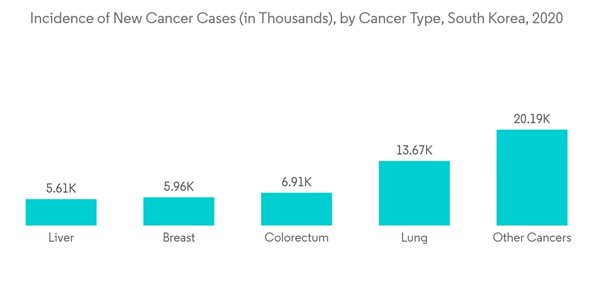The COVID-19 pandemic had a significant impact on the digital x-ray market in South Korea. Various research studies have been published to provide insight into the effects of the pandemic on the studied market. The state of common cancer in 2019 and 2020 were compared in the study "Innovative Countermeasures Can Maintain Cancer Care Continuity During the Coronavirus Disease-2019 Pandemic in Korea," which was published in the European Journal of Cancer in July 2020. According to the article's findings, 1,694 initial cancer diagnoses were made in total in 2019 as opposed to 1,445 in 2020, a decline of 14.7%. As a result, the pandemic adversely impacted digital imaging methods during the initial stages of South Korea's cancer screening program. Furthermore, according to data from the British Dental Journal that was released in June 2020, South Korea has effectively repelled the virus without enforcing a lockdown and has continued to offer standard dental care throughout this time. According to the same source, the Korean Dental Association (KDA) stated that they could not stop dental offices from treating patients and that it was up to the patients to weigh the risks and decide whether to postpone or continue dental care during the outbreak. As a result, dental care was still provided throughout the nation despite the pandemic. The aforementioned elements adversely affected market expansion throughout South Korea's epidemic phase. The market, however, is anticipated to grow in the future.
The increasing prevalence of diseases such as the geriatric population and initiatives by key market players are expected to increase the market growth. The elderly population in the country made up 15.7% of the total population in 2020, according to Statistics Korea, and it is predicted that by 2025 when it reaches 20.3%, South Korea will become a super-aged society. Because the elderly population is more susceptible to chronic illnesses like heart attacks, the demand for x-ray devices for early diagnosis in the country. Numerous advancements are happening, such as product releases, product approvals, and market collaborations for this application in South Korea. For instance, in June 2020, the creator of a digital x-ray bed Nanox received an extra USD 20 million investment from South Korea's SK Telecom. Thus, it is anticipated that the market will expand as a result of additional innovations in this area. Similar to this, Vieworks Co., Ltd., a South Korean firm that specializes in X-ray imaging, announced the release of its VIVIX-D series with IGZO TFT and VIVIX-C series with CMOS line sensor in September 2021. Thus, the abovementioned factors are expected to increase market growth.
However, the high cost of the equipment is expected to hinder market growth.
South Korea Digital X-Ray Market Trends
Cancer Segment is Expected to Hold a Significant Market Share Over the Forecast Period
The factors propelling the growth of this market are the increased frequency of various cancer illnesses, the nation's expanding research, and technological developments. Strategic measures are also anticipated to support the development of the future market. In South Korea, there were 230,317 new cases of cancer in 2020, and 350,598 instances are expected by 2040, according to Globocan 2020. The predicted rise in cancer cases would have an impact on how often x-ray machines are used in the nation to diagnose various types of cancer. As a result, it is projected that the market under investigation would experience significant expansion over the forecast period. In South Korea, x-rays are frequently used in research investigations to diagnose cancer. For instance, in April 2020, the Radiological Society of North America (RSNA) Radiology journal published an article with the title "Lung Cancer CT Screening and Lung-RADS in a Tuberculosis-endemic Country: The Korean Lung Cancer Screening Project (K-LUCAS)". The researchers concluded that in a group at risk, tuberculosis sequelae decreased the specificity of lung cancer CT screening utilizing the Lung CT Screening Reporting and Data System. As a result, lung cancer can be screened for using x-ray-based CT imaging. There are a lot of innovations happening in South Korea, including partnerships in the market there for this application. For instance, in June 2021, South Korean companies, VUNO Inc. and Samsung Electronics Co., Ltd. agreed to new cooperation to integrate VUNO Med-Chest X-ray, a premium mobile digital x-ray system from Samsung, inside the GM85. The integrated mobile X-ray suite from Samsung will be able to scan an image while the patient is still in the hospital and send AI results immediately using VUNO's AI. Thus, it is anticipated that the market will expand as a result of additional innovations in this area.Hence, the above factors are further expected to improve the market growth in this segment.
South Korea Digital X-Ray Industry Overview
South Korea digital x-ray market is moderately competitive and consists of several major players. Some of the companies that are currently dominating the market are Carestream Health, Siemens Healthineers AG, GE Healthcare, Canon Medical Systems Corporation, and Koninklijke Philips NV among others.Additional Benefits:
- The market estimate (ME) sheet in Excel format
- 3 months of analyst support
This product will be delivered within 2 business days.









